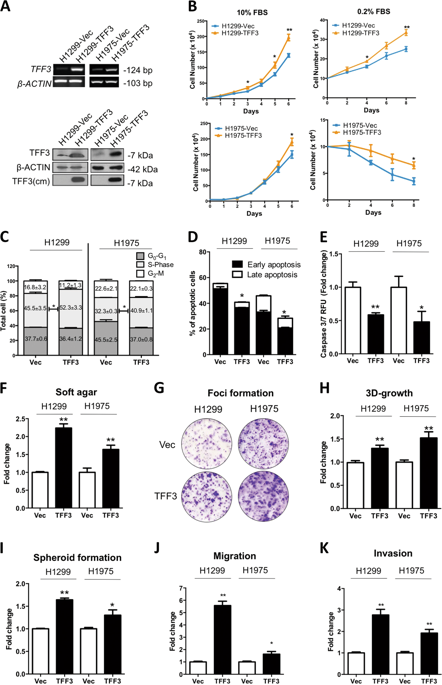Oncogenesis ( IF 6.2 ) Pub Date : 2019-11-04 , DOI: 10.1038/s41389-019-0173-8 Mengyi Zhang , Baocheng Wang , Qing-Yun Chong , Vijay Pandey , Zhirong Guo , Ru-Mei Chen , Lingzhi Wang , Yanxin Wang , Lan Ma , Alan P. Kumar , Tao Zhu , Zheng-Sheng Wu , Zhinan Yin , Basappa , Boon-Cher Goh , Peter E. Lobie

|
TFF3 has been identified as a novel biomarker to distinguish between lung adenocarcinoma (ADC) and lung squamous-cell carcinoma (SCC). Herein, we determined the oncogenic functions of TFF3 and demonstrated the potential of pharmacological inhibition of TFF3 in lung ADC using a novel small-molecule inhibitor of TFF3 dimerization (AMPC). Forced expression of TFF3 in lung ADC cells enhanced cell proliferation and survival, increased anchorage-independent growth, cancer stem cell behavior, growth in 3D Matrigel, and cell migration and invasion. In contrast, depleted expression of TFF3 suppressed these cellular functions. Mechanistically, TFF3 exerted its oncogenic function through upregulation of ARAF and hence enhanced downstream activation of MEK1/2 and ERK1/2. Pharmacological inhibition of TFF3 by AMPC, resulted in markedly decreased cell survival, proliferation, 3D growth and foci formation, and impaired tumor growth in a xenograft mouse model. Moreover, the combination of various MEK1/2 inhibitors with AMPC exhibited synergistic inhibitory effects on lung ADC cell growth. In conclusion, this study provides the first evidence that TFF3 is a potent promoter of lung ADC progression. Targeting TFF3 with a novel small-molecule inhibitor alone or in combination with conventional MEK1/2 inhibitors are potential strategies to improve the outcome of lung ADC.
中文翻译:

三叶因子3(TFF3)的新型小分子抑制剂可增强MEK1 / 2在肺腺癌中的抑制作用
TFF3已被鉴定为区分肺腺癌(ADC)和肺鳞状细胞癌(SCC)的新型生物标志物。本文中,我们确定了TFF3的致癌功能,并证明了使用新型TFF3二聚体小分子抑制剂(AMPC)在肺ADC中抑制TFF3的药理作用。TFF3在肺ADC细胞中的强制表达增强了细胞的增殖和存活,增加了不依赖贴壁的生长,癌症干细胞的行为,3D Matrigel中的生长以及细胞迁移和侵袭。相反,TFF3的表达减少抑制了这些细胞功能。从机理上讲,TFF3通过上调ARAF发挥其致癌作用,从而增强了MEK1 / 2和ERK1 / 2的下游激活。AMPC对TFF3的药理抑制作用导致细胞存活率显着降低,异种移植小鼠模型中的增殖,3D生长和病灶形成以及受损的肿瘤生长。此外,各种MEK1 / 2抑制剂与AMPC的组合对肺ADC细胞的生长具有协同抑制作用。总之,这项研究提供了第一个证据,表明TFF3是肺ADC进程的有效启动子。单独或与常规MEK1 / 2抑制剂联合使用新型小分子抑制剂靶向TFF3是改善肺部ADC疗效的潜在策略。



























 京公网安备 11010802027423号
京公网安备 11010802027423号